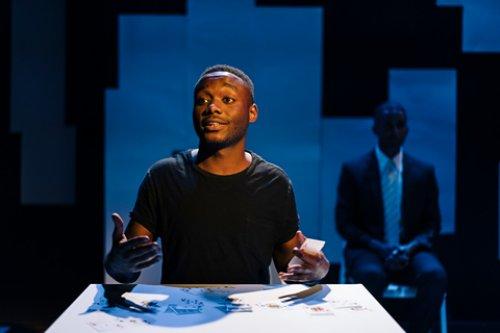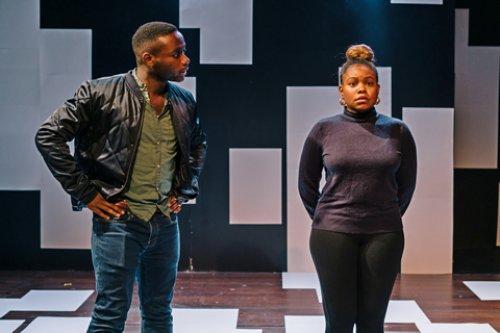Patience
This drama about a competitive solitaire champ who’s contemplating retirement suffers because its protagonist comes off not as torn but as merely iffy.

Joshua Gitta in a scene from Johnny G. Lloyd’s “Patience” at the Corkscrew Theater Festival (Photo credit: Aaron Weiss)
[avatar user=”Mark Dundas Wood” size=”96″ align=”left” ] Mark Dundas Wood, Critic[/avatar]
A quick Google search confirms that there truly is such a thing as competitive solitaire. However, there is no real-life equivalent to the kind of phenomenon imagined in Johnny G. Lloyd’s play Patience, which is being presented as part of Manhattan’s Corkscrew Theater Festival under Velani Dibba’s direction. In Lloyd’s universe, a champion solitaire player seems to be nearly as big a public figure as a champion prizefighter or an international tennis star.
In fact, the show’s young protagonist—solitaire’s #1 player worldwide, Daniel Bryant (Joshua Gitta)—has been compared to Venus Williams. Solitaire is both his game and his career. He is someone who must be careful to be polite when fans are around, because social media throws shade at celebrities like him when they misbehave in public. Daniel frets that there may be a solitaire-world equivalent of Venus’ sister Serena Williams at hand: someone eager to dethrone the king.
He has mixed feelings about his status in the game. At the top of the play, he has become engaged to his boyfriend, Jordan (Christopher Rand), and they are preparing to move in together. Part of Daniel wants to retire, to leave the game for a more relaxed if less glamorous life. Early on in the story, he reveals this desire publicly. He feels, on the other hand, a responsibility to keep on going—in part because his mother (Brenda Crawley) is his manager, and her livelihood depends on his continuation in the game.
Unfortunately, Daniel’s ambivalence proves to be an impediment to the success of Patience. It would be one thing if he were a strong character, torn about which path he’ll take moving forward. Rather, he seems to be a customarily wishy-washy guy, who avoids making choices (or “decisions”—the play suggests there’s a difference). Other characters accuse him of speaking vaguely and not answering questions directly. He certainly seems not to be socially adept.

Joshua Gitta, Christopher Rand, DeAnna Supplee (standing), Brenda Crawley and Kristin Dodson in a scene from Johnny G. Lloyd’s “Patience” at the Corkscrew Theater Festival (Photo credit: Aaron Weiss)
This is especially frustrating to Jordan, who frets that, at some point after the nuptials, he’ll be notified by Daniel’s representatives that the marriage is over. Instead of reassuring him, Daniel suggests that the time may well come when he and Jordan both realize the hard truth: “I might only be my best self when I’m alone.” Perhaps you can respect his honesty, brutal as it may be. But it’s hard to feel much sympathy for such an icy—or, at any rate, tactless—protagonist. He seems, at times, to want to engage more with others. He doesn’t, however, seem troubled so much as bored.
Indecisive souls don’t always make for unsatisfying drama. Hamlet is an ambivalent fellow, too—but he has all of those juicy, iconic soliloquies. Daniel has something in that line here, when he shares his inner monologue with the audience during a climactic solitaire match. This sequence, perhaps revealing the character’s touted “best self,” arguably gives Gitta his best moments in the role, but does it make Daniel any more likable?
Patience is a talky play, and one in which the characters regularly go on at exhausting length about their feelings. This leaves little subtext for the actors to explore. There are lots of pauses—at least some of which Lloyd has written into the script. Often, these serve to make the dialogue seem stilted and drawn out. Through it all, we get little detail about the characters’ daily life or past history. We have no information, for instance, about how Daniel and Jordan met, how they came to be a couple. Certainly, they could not have gotten this far into a relationship without Jordan gaining some idea of what he was getting into. We get a bit more information about Daniel’s childhood and family situation, although info about his father is dispensed with in a few quick lines.

Joshua Gitta and Kristin Dodson in a scene from Johnny G. Lloyd’s “Patience” at the Corkscrew Theater Festival (Photo credit: Aaron Weiss)
The actors strive to make it all work, but seldom do the characters seem like actual, multidimensional people. They do seem to be a most unsatisfied lot. Even Daniel’s best friend, Nikita (DeAnna Supplee)—a solitaire player who has left the competitive sphere and is purportedly happy to be out if it—doesn’t seem especially upbeat.
Of all the cast members, Crawley seems the most engaged. She truly seems to listen to what the other actors say. Also providing some good moments is Kristin Dodson as naïve but determined Ella, a very young solitaire player with “flair,” who may someday prove to be the Serena to Daniel’s Venus. She turns in a quirky and memorable performance, one that would be even better if she didn’t rush some of her speeches.
Aoshuang Zhang’s scene design and Daniel Schreckengost lighting design are simple and functional, as befits a festival staging. Costume designer Antonio Consuegra makes his mark, particularly with his bold looks for Ella, which help confirm her aforementioned flair.
Patience (through August 2, 2019)
Corkscrew Theater Festival and Jon Bleicher
Paradise Factory, 64 East 4th Street, in Manhattan
For tickets, call 347-954-9125 or visit http://www.corkscrewfestival.org
Running time: 90 minutes without an intermission






Leave a comment